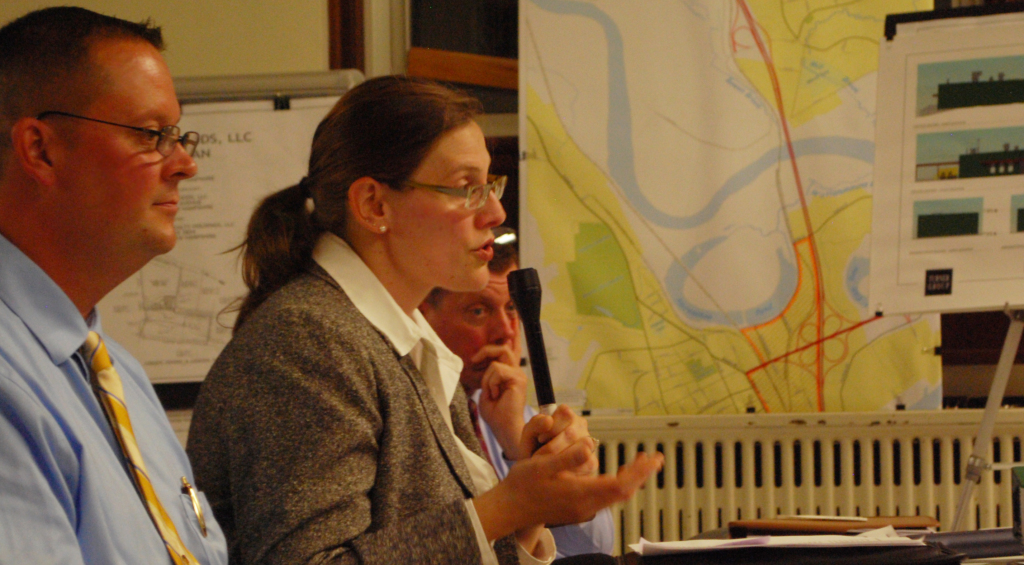
Craig Fournier, co-founder and co-owner of Fournier Foods with attorney Amy Manzelli during the public hearing held on October 1 in Concord. A decision on the proposal for the USDA certified poultry facility is likely to happen in November.
Concord, N.H. – October 2, 2014 – A full house of East Concord residents and New Hampshire farmers met last night before the city planning board. A public hearing to address the application for a major site plan of a USDA certified poultry processing plant was met with enthusiasm and concern.
Property owners expressed their worries about odor and fears of property devaluation resulting from the proposed Fournier Foods, LLC facility. Whereas local farmers voiced their excitement and support for the processor, as it will enable them to expand their businesses in a growing market.
Fournier Foods, LLC co-owners Omar Khudari and Craig Fournier are seeking approval for construction at 52 Locke Road, a 20-acre lot situated in an industrial zoned area.
“We will be a model business that produces local food,” said Fournier during the five hour hearing. “Odor can be managed and won’t be an issue. We assure you that we will be the kind of facility you will be proud to have in your neighborhood, while meeting the critical need for New Hampshire agriculture.”
Considering that the roughly 5,500-square-foot proposed facility meets all city requirements, it is doubtful the board will reject the application.
The Fournier Foods team included engineers, an architect, a traffic specialist and experienced personnel from Webber/Smith Associates, an engineering firm specializing in food facilities from Iowa. The team provided a thorough review of the proposal and discussed the unloading of birds, processing, water use and odor management.
It is an ideal location located off of Exit 16 from Interstate 93 with no direct residential abutters. Fournier explained that the site would accommodate over 100 farmers within an hour drive. In addition, the site has the necessary infrastructure for such a facility.
The current situation for poultry meat producers in the Granite State hinders the local demand. For farmers to sell poultry meat legally (without USDA inspection), they cannot process more than 1,000 birds on their farm. This reduces availability of locally raised poultry to restaurants, grocery stores and direct consumers.
“Inadequate USDA certified processing facilities in New Hampshire limits farmers and consumers,” said Amy Manzelli with BCM Environmental & Land Law representing Fournier Foods. “We are about to open up a tremendous market for small scale poultry farming in the state.”
Andrew Howe of Beans & Greens Farm in Gilford started raising chickens three years ago. “It is our biggest seller in our retail store as it is the most affordable meat,” said Howe. “Our customers want fresh local chicken so we slaughter weekly on the farm. But we are limited to 1,000 birds by law. Having a USDA processor 25 minutes away would enable me to possibly expand my operation to 4,000 or 5,000 birds.”
At this point, Fournier Foods expects to process chickens and turkeys only. Geese and ducks may be considered at a later date.
The facility has been designed to manage 2,000 birds per eight-hour shift, with the expectation of three shifts totaling a 6,000 daily limit. To manage the workload, 23 employees will be hired.
Policy Director Rob Johnson spoke on behalf of the New Hampshire Farm Bureau Federation. “The Farm Bureau board of directors believes this is the best location for success,” stated Johnson. “It is centrally located in the state, which will maintain and encourage new farms to grow.”
Johnson also addressed some of the residents’ concerns about large-scale poultry farms coming to New Hampshire. “It’s not practical,” noted Johnson. “Large poultry farms exist in other parts of the country because there is feed readily available. It is a lot less expensive to produce poultry and livestock in other areas and ship it here.”
Concord Planning Board Chairman Gerry Drypolcher suggested the city hire an expert to conduct an independent odor review and that the applicant would be responsible for the expense. As for traffic, water usage and ordinance enforcement, city staff will investigate and report on.
The planning board will meet again on October 15 and an official decision is likely to happen in November.
